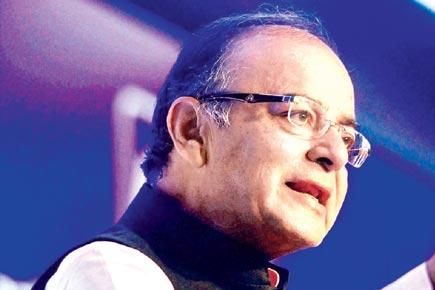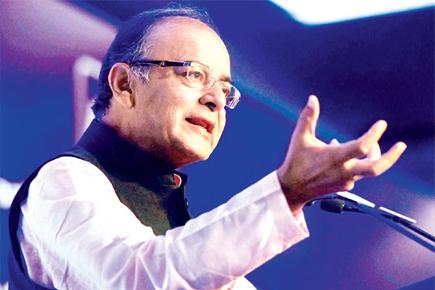While giving a call to break away from obsolete policies to develop the country's eastern region, union Finance Minister Arun Jaitley on Sunday said it was possible to achieve 8 to 10 percent economic growth

Arun Jaitley
Kolkata: While giving a call to break away from obsolete policies to develop the country's eastern region, union Finance Minister Arun Jaitley on Sunday said it was possible to achieve 8 to 10 percent economic growth.

Arun Jaitley
ADVERTISEMENT
"I do believe it is (8 percent and above growth) achievable... if we take right steps in the right direction. In order to achieve it, it is extremely important that we open ourselves for investments," Jaitley said at an Indian Chamber of Commerce event.
Earlier, speaking at the launch of the Bandhan Bank here, the Bharatiya Janata party (BJP) leader promised the central government's cooperation to the Trinamool Congress-ruled West Bengal.
"... The party to which I belong (BJP) and the party (Trinamool Congress) which rules the state are strongly opposed and that probably will continue. But in terms of development of the country and the state, the political difference will not matter, and we will fully cooperate in the development and growth of West Bengal," he said.
"With the cooperation between the Centre and the state, we will work together towards the advance growth rate which eventually enables us to bring prosperity," Jaitley said.
"What is most important is the birth of a Bengal entrepreneur, which is of utmost importance for the revival and growth of the fundamentals of Bengal," he said.
Taking a dig at the Left Front, which ruled the West Bengal from 1977 to 2011, Jaitley said he was pleasantly surprised to see the city painted in blue (colours of the new bank) instead of the red (symbolising the Marxists).
"When the city was painted red, of course, new institutions were not being born. The existing ones were shifting out and Bengal was known not for producing many entrepreneurs but certainly known for producing intellectuals, even (Bandhan bank chairman) Ashok Lahiri and (state finance minister) Amit Mitra had shifted out.
"I do hope (it is) this change of colour that has brought back both of them," the finance minister said, pointing to the duo seated on the dais.
Reiterating Prime Minister Narendra Modi's call that the development of the eastern region was a must, Jaitley conceded that the country's western part was far more developed and stressed on the need for creating more economic activities and growth in eastern Uttar Pradesh, West Bengal, Bihar, Odisha and the northeast region.
He said the eastern and the north-eastern region of the country were endowed with natural resources, and contended it was imperative to "break from some of the obsolete policies of the past and realise potential of the area which are of extreme importance".
Harping on the significance of the centre's financial inclusion programme, he said the initiatives will prevent people from getting fleeced by "unreliable" financial institutions.
"It is the expansion of this segment (banking) -- which will help keep people away from investing in otherwise unreliable agencies -- which has created problems in many states like West Bengal," said Jaitley.
The finance minister's remarks came in the backdrop of several deposit-seeking firms, including the Saradha group, going bust, and in turn ruining lakhs of investors - mostly from rural areas - across states like Bengal, Odisha, Jharkhand and Assam.
Jaitley also said the Narendra Modi government's 'Jan Dhan Yojana' and the recently launched social security schemes have linked a large section of the so far unbanked people to the banking network.
The minister said while the global situation might not be very promising, India could have an opportunity if it gets its fundamentals right.
He iterated the government's objective of bringing down the corporate tax from 30 percent to 25 percent over a time period.
"I will bring down the rate of corporate tax from 30 percent to 25 percent even though the (prevalent) rate is 30 percent the effective rate is 22. The reason is there are as large number of exemptions," he added.
 Subscribe today by clicking the link and stay updated with the latest news!" Click here!
Subscribe today by clicking the link and stay updated with the latest news!" Click here!







